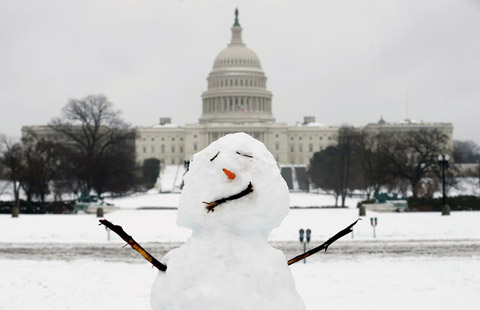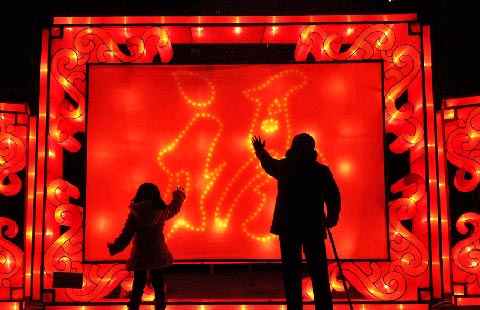Syria in crossroads as Geneva talks deadlocked
Updated: 2014-02-16 20:55
(Xinhua)
|
|||||||||||
Syria's Information Minister Omran al-Zoubi said that talks about the failure of the Geneva talks are incorrect and exaggerated, adding that the UN Envoy to Syria Lakkhdar Brahmi and senior Syrian negotiator Bashar al-Jaafari said that work along the political track will continue and that there will be follow- ups to the second round.
Muin Amatori, a political analyst, agreed with al-Zoubi that the internationally-backed peace conference hasn't failed, saying the engagement of the Syrian government and the opposition in the dialogue is a positive point.
Speaking to Xinhua, Amatori called for expanding the representation of the opposition forces in Syria in the conference as the coalition doesn't represent all of the opposition forces.
He said that the conference will have several rounds "and eventually a suitable formula for a solution will be agreed upon especially that the international community encourages the political process."
Yet, the current situation on ground will still the same amid reports of possible escalation in Western pressure against Damascus until a political breakthrough has been achieved.
The Syrian authorities said they will keep fighting terrorism and at the same time keeping their efforts to establish reconciliations.
Over the past three days, the military has massed up forces in the surroundings of the central town of Yabroud, one of the most crucial towns in central Syria, whose recapture by the military would deprive the rebels of their last key strongholds in the Homs province on the borders with Lebanon.
The operation is the latest in a series of other military successful offensives, in which the Syrian troops have regained the upper hand against the various rebel factions, including those who are linked to al-Qaida.
Beside their operations, the Syrian authorities have also managed to establish reconciliation with a number of rebel groups in the countryside of the capital Damascus to facilitate the return of thousands of displaced people to their homes.
Meanwhile, and as the Geneva negotiating process hasn't delivered yet, the Western powers, mainly the US, are expected to ramp up pressure against the Damascus administration.
President Barack Obama revealed on Friday he was considering new ways to pressure the Syrian government, saying: "There will be some intermediate steps that we can take to exercise more pressure to the Assad government and we are going to continue to work with all the parties concerned to try to move forward on a diplomatic solution."
Obama did not disclose what steps he has under consideration, but local analysts said the US will resume supporting the rebels with weapons and logistical support.
Analysts also expected the US to politicize and make use of the humanitarian file of Syria, especially when Moscow rejected a recent Western-backed UN draft resolution about humanitarian situation in Syria, considering it as basis for military action.
Russia announced it would veto the text - drafted by Australia, Luxembourg and Jordan - because it contains "one-sided accusations " against government of President Bashar al-Assad.
Russia's Deputy Foreign Minister Gennady Gatilov said the draft resolution's "whole purpose and aim is to create grounds for future military action against the Syrian government if some demands it includes are not met."
Related Stories
No much progress in Syria peace talks 2014-02-15 21:06
Syria talks to go into third round 2014-02-14 21:19
US, Russia pledge to unblock Syria talks 2014-02-14 09:31
UN chief slams killing of civilians in Syria 2014-02-12 10:04
Geneva II talks resume over Syria 2014-02-10 20:46
Aid truckloads enter Syria's besieged Homs 2014-02-09 10:04
Today's Top News
No much progress in Syria peace talks
Lantern Festival fires kill 6 in China
China urges US to respect history
KMT leader to visit mainland
11 terrorists dead in Xinjiang
Illegal detention reports probed
4 die in Austrian train-car crash
China spends billions on rural education
Hot Topics
Lunar probe , China growth forecasts, Emission rules get tougher, China seen through 'colored lens', International board,
Editor's Picks

|

|

|

|

|

|





